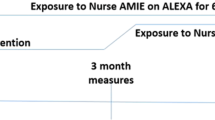Abstract
Background
Although metastatic breast cancer (MBC) survival is improving, symptoms remain a significant burden. Returning to a cancer center for symptom management can be challenging. Technology-enabled supportive care platforms are worth exploration.
Methods
Seventeen patients with MBC were randomized to immediate or delayed start for a 3-month intervention that included daily tablet-based guideline-concordant self-care for pain, distress, fatigue, and sleep disturbance, as well as weekly calls with a patient navigator. The primary outcome was patient acceptability. We also assessed feasibility, patient satisfaction, and cost and compared between group differences for symptoms. RM-ANOVA examined between group differences over time. Hedges’ d effect sizes quantified magnitude of differences in change between immediate and delayed start.
Results
Sixty-eight percent of patients approached accepted the tablet-based intervention. Patients interacted with the tablet 48% of possible days. Patient satisfaction ranged from 83 for walking to 49% for the psychological interventions. The cost of delivering Nurse AMIE for 3 months was $570.23. Small nonsignificant improvements were found for fatigue (d=0.24). Nonsignificant, but potentially clinically meaningful, moderate reductions were found for sleep (d=0.65) and distress (d=0.74).
Discussion
A tablet-based supportive care platform that offers guideline-concordant self-care for pain, fatigue, sleep, and distress was observed to be highly acceptable and feasible for patients with metastatic breast cancer. Patient satisfaction scores and initial evaluation of efficacy are promising, and the platform warrants further investigation.
Implications for Cancer Survivors
Technology-based self-care is a promising option to address symptoms in patients with metastatic breast cancer.

Similar content being viewed by others
References
Willis K, Lewis S, Ng F, Wilson L. The experience of living with metastatic breast cancer—a review of the literature. Health Care Women Int. 2015;36:514–42.
Schmitz KH, Zhang X, Winkels R, Schleicher E, Mathis K, Doerksen S, et al. Developing “Nurse AMIE”: a tablet-based supportive care intervention for women with metastatic breast cancer. Psychooncology. 2020;29:232–6.
Carpenter JS, Andrykowski MA. Psychometric evaluation of the Pittsburgh Sleep Quality Index. J Psychosom Res. 1998;45:5–13.
Mendoza TR, Wang XS, Cleeland CS, Morrissey M, Johnson BA, Wendt JK, et al. The rapid assessment of fatigue severity in cancer patients: use of the Brief Fatigue Inventory. Cancer. 1999;85:1186–96.
Keller S, Bann CM, Dodd SL, Schein J, Mendoza TR, Cleeland CS. Validity of the brief pain inventory for use in documenting the outcomes of patients with noncancer pain. Clin J Pain. 2004;20:309–18.
Hedges LV, Olkin I. Statistical methods for meta-analysis. Orlando: Academic Press; 1985.
Basch E, Deal AM, Kris MG, Scher HI, Hudis CA, Sabbatini P, et al. Symptom monitoring with patient-reported outcomes during routine cancer treatment: a randomized controlled trial. J Clin Oncol. 2016;34:557–65.
Berger AM, Mooney K, Alvarez-Perez A, Breitbart WS, Carpenter KM, Cella D, et al. National comprehensive cancer n: Cancer-Related Fatigue, Version 2.2015. J Natl Compr Cancer Netw. 2015;13:1012–39.
Agmon-Levin N, Damoiseaux J, Kallenberg C, Sack U, Witte T, Herold M, et al. International recommendations for the assessment of autoantibodies to cellular antigens referred to as anti-nuclear antibodies. Ann Rheum Dis. 2014;73:17–23.
Lizée T, Basch E, Trémolières P, Voog E, Domont J, Peyraga G, et al. Cost-effectiveness of web-based patient-reported outcome surveillance in patients with lung cancer. J Thorac Oncol. 2019;14:1012–20.
Funding
Avon Breast Cancer Crusade
Author information
Authors and Affiliations
Corresponding author
Ethics declarations
Conflict of interest
The authors declare that they have no conflict of interest.
Additional information
Publisher’s note
Springer Nature remains neutral with regard to jurisdictional claims in published maps and institutional affiliations.
Rights and permissions
About this article
Cite this article
Schmitz, K.H., Schleicher, E., Doerksen, S. et al. Testing the acceptability and feasibility of a tablet-based supportive cancer platform for patients with metastatic breast cancer. J Cancer Surviv 15, 410–413 (2021). https://doi.org/10.1007/s11764-021-01021-x
Received:
Accepted:
Published:
Issue Date:
DOI: https://doi.org/10.1007/s11764-021-01021-x




